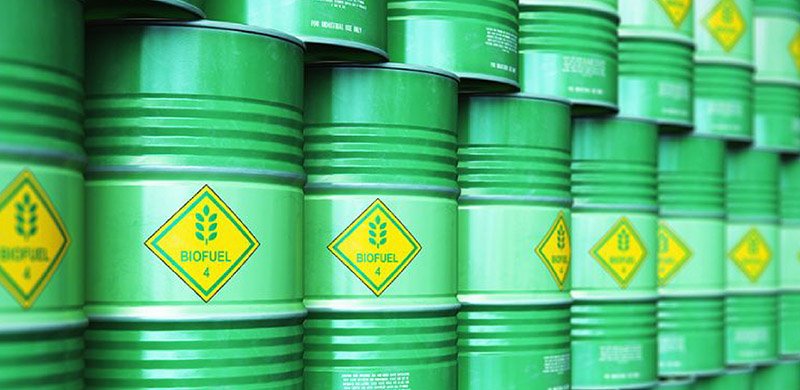Blending of Bio Diesel
Biodiesel is a clean-energy solution for fleets and other end users who want to reduce harmful emissions. Biodiesel is also a drop-in fuel — virtually all diesel engines can run on biodiesel blends ranging from 5% to 20% without modification. Biodiesel is the fuel that can bring all these benefits to fleets, retailers and wholesalers. Using 100% biodiesel (B100) eliminates all of the sulfur emissions associated with conventional diesel, cuts emissions of carbon monoxide and smog-producing particulate matter almost in half, and reduces hydrocarbon emissions by between 75% and 90%. Perhaps most significantly, using B100 reduces the emissions of carbon dioxide—the main greenhouse gas causing global warming—by more than 75%. Even using a blended biodiesel fuel like B20 (a 20% biodiesel / 80% petrodiesel blend offered at most biodiesel fueling stations) still reduces carbon dioxide emissions by 15%.
Blends of B20 biodiesel and lower can be used in diesel equipment with no modifications. Customers can use the biodiesel as it is or blend the Biodiesel at different ratios:
B100 – 100% biodiesel
B20 – 20% biodiesel, 80% petro-diesel
B5 – 5% biodiesel, 95% petro-diesel
B2 – 2% biodiesel, 98% petro-diesel

Industry Applications
As per BIS, Biodiesel can also be used up to 20% Blend with regular diesel for any mobile application without any major modification in the Engine. Oil Marketing Companies in India (IOCL, HPCL, BPCL) blend Biodiesel (B-100) up to 5% to Petro Diesel & Sale the Blend through their Retail Outlets. Indian Railways uses 5% blend of biodiesel with petro-diesel to run its locomotives. Transport is 23% of all human CO2 emissions are through transport applications. Converting to BioDiesel will be critical in combatting climate change and it increases efficiency at a reasonable cost. States like Karnataka have adopted biofuels widely, including in the state-run corporation buses.
Advantages:
Price: Using Bio-Diesel could give a huge competitive advantage for the user. It’s produced locally. It’s an environment-friendly fuel that in some cases outperforms petroleum diesel, and often at a better price. It’s a very dependable form of fuel. Biofuels can help reduce import dependency on crude oil and save our nation millions of dollars in Foreign Exchange.
Engine Operation: Biodiesel improves fuel lubricity and raises the octane number of the fuel. A higher cetane number means the engine is easier to start and reduces ignition delay. Diesel engines depend on the lubricity of the fuel to keep moving parts from wearing prematurely.
Energy and Performance: With B100, the refining (esterification or transesterification) process and blending of B100 from different feedstocks has no significant effect on energy content. The energy content of B100 varies little because the energy content of the fats and oils used in biodiesel production is highly similar. Therefore, B100 made from most of the common feedstocks will have the same fuel economy, power, and torque when burned in an engine.
Low-Temperature Properties: The low-temperature properties of biodiesel and conventional petroleum diesel are extremely important. Unlike petroleum diesel, biodiesel can freeze as the temperature drops. Different diesel fuel formulations are sold during the winter in many climates. If the fuel begins to gel, it can clog filters on dispensing equipment and may eventually become too thick to pump.
Renewable: A product is more valued when it is renewable. All that we know about fossil fuels are, they are dusty smokes that play a major role in air pollution. Biodiesel is made efficient in nature due to the usage of used cooking oils as raw materials. Every town in India produces tonnes of waste oil every day. We have a professional edible oil collection system to source waste oil from various places. Our main sources of UCO are restaurants, bakeries, food chains etc. By efficiently converting UCO waste into biofuel we help the Municipality in disposing of UCO waste safely which could have resulted in alarming sewage problems.
Environment: Biodiesel has emerged as a favourable alternative to fossil fuels in a warming world. It is non-toxic, biodegradable, environmentally friendly and
Lower CO2 emissions help reduce the impacts of global warming. Bio Diesel is 100% repurposed by waste oil that can be used as a new source of energy. Through this process, we fulfil the whole lifecycle of sustainability – Reduce, Reuse, Recycle. The result is a less expensive, renewable and clean fuel.

